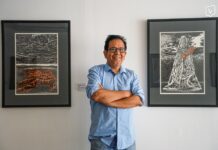THE JAPAN Foundation Manila (JFM) celebrated renowned filmmaker Akira Kurosawa’s 100th birth anniversary through the Kurosawa Film Festival last September 14 to 19 at the Cultural Center of the Philippines (CCP) and September 22 to 30 at the University of the Philippines Film Institute (UPFI).
“A lot of people really came to watch the films and showed great interest in Kurosawa’s works,” said Roland Samson, JFM’s project coordinator for the festival. He also said that more than 6,000 people headed to both venues, most of them were students.
The JFM, in partnership with the CCP and the UPFI, offered free public screenings of the Japanese icon’s 21 full-length films.
Akira Kurosawa was an internationally-acclaimed film director, screenwriter, editor, and producer who started out in the film industry in 1936.
He also dabbled in the art scene as a painter but decided to master the art of cinema instead. Kurosawa is best known for the use of recurring themes like life struggles, larger-than-life heroes, master-protégé relationships and love for freedom and independence.
His critically acclaimed film, “Rashomon” (1951) depicts the heinous murder of a samurai shown from different perspectives of four witnesses.
Shot in black and white film, this movie effectively illustrates the evils of human nature and a person’s audacity when threatened by fear or peril.
Probably one of the movies that made Kurosawa the benchmark for cinematic prolificacy, “Seven Samurai” depicts a common situation during the feudal times of Japan. It tells the story of how a village protected their crops from bandits through the help of an elder samurai, Kambei (Takashi Shimura), and his band of six swordsmen.
“Waga Seishun ni Kuiniashi” or “No Regrets for Our Youth” is set just before World War II, during the height of fascism in Japan. The storyline was inspired by the Takigawa Incident of 1833, when law professor Takigawa Yukitori was suspended from teaching at the Kyoto Imperial University because he was said to have advocated Marxist ideologies which would have encouraged the students to make a stand for their own beliefs.
The political sketch revolved around the whirlwind love story of Ruykichi Noge, an activist, and Yukie Yagihara, the daughter of a university professor who got fired in the heat of the political turmoil during that time. “No Regrets for Our Youth” observed a singular theme––the fight for freedom and the sacrifices this entails.
With artful screenplays, witty storylines and the heavy use of symbolism in filmmaking, Kurosawa has not only made a name for himself, but has changed the face of World Cinema as well. Brylle B. Tabora and Alyosha J. Robillos













